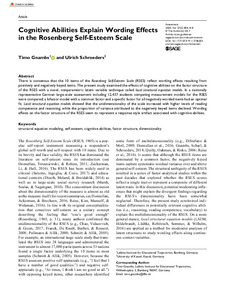Datum
2017-12-18Metadata
Zur Langanzeige
Aufsatz

Cognitive Abilities Explain Wording Effects in the Rosenberg Self-Esteem Scale
Zusammenfassung
There is consensus that the 10 items of the Rosenberg Self-Esteem Scale (RSES) reflect wording effects resulting from positively and negatively keyed items. The present study examined the effects of cognitive abilities on the factor structure of the RSES with a novel, nonparametric latent variable technique called local structural equation models. In a nationally representative German large-scale assessment including 12,437 students competing measurement models for the RSES were compared: a bifactor model with a common factor and a specific factor for all negatively worded items had an optimal fit. Local structural equation models showed that the unidimensionality of the scale increased with higher levels of reading competence and reasoning, while the proportion of variance attributed to the negatively keyed items declined. Wording effects on the factor structure of the RSES seem to represent a response style artifact associated with cognitive abilities.
Zitierform
In: Assessment (ASM) Volume 27 / Issue 2 (2017-12-18) , S. 404-418 ; EISSN 1552-3489Zusätzliche Informationen
NationallizenzZitieren
@article{doi:10.17170/kobra-202101213016,
author={Gnambs, Timo and Schroeders, Ulrich},
title={Cognitive Abilities Explain Wording Effects in the Rosenberg Self-Esteem Scale},
journal={Assessment (ASM)},
year={2017}
}
0500 Oax
0501 Text $btxt$2rdacontent
0502 Computermedien $bc$2rdacarrier
1100 2017$n2017
1500 1/eng
2050 ##0##http://hdl.handle.net/123456789/12439
3000 Gnambs, Timo
3010 Schroeders, Ulrich
4000 Cognitive Abilities Explain Wording Effects in the Rosenberg Self-Esteem Scale / Gnambs, Timo
4030
4060 Online-Ressource
4085 ##0##=u http://nbn-resolving.de/http://hdl.handle.net/123456789/12439=x R
4204 \$dAufsatz
4170
5550 {{Strukturgleichungsmodell}}
5550 {{Selbstwertgefühl}}
5550 {{Kognitive Kompetenz}}
7136 ##0##http://hdl.handle.net/123456789/12439
<resource xsi:schemaLocation="http://datacite.org/schema/kernel-2.2 http://schema.datacite.org/meta/kernel-2.2/metadata.xsd"> 2021-01-25T08:59:23Z 2021-01-25T08:59:23Z 2017-12-18 doi:10.17170/kobra-202101213016 http://hdl.handle.net/123456789/12439 Nationallizenz eng Urheberrechtlich geschützt https://rightsstatements.org/page/InC/1.0/ structural equation modeling self-esteem cognitive abilities factor structure dimensionality 150 Cognitive Abilities Explain Wording Effects in the Rosenberg Self-Esteem Scale Aufsatz There is consensus that the 10 items of the Rosenberg Self-Esteem Scale (RSES) reflect wording effects resulting from positively and negatively keyed items. The present study examined the effects of cognitive abilities on the factor structure of the RSES with a novel, nonparametric latent variable technique called local structural equation models. In a nationally representative German large-scale assessment including 12,437 students competing measurement models for the RSES were compared: a bifactor model with a common factor and a specific factor for all negatively worded items had an optimal fit. Local structural equation models showed that the unidimensionality of the scale increased with higher levels of reading competence and reasoning, while the proportion of variance attributed to the negatively keyed items declined. Wording effects on the factor structure of the RSES seem to represent a response style artifact associated with cognitive abilities. open access Gnambs, Timo Schroeders, Ulrich doi:10.1177%2F1073191117746503 Strukturgleichungsmodell Selbstwertgefühl Kognitive Kompetenz publishedVersion EISSN 1552-3489 Issue 2 Assessment (ASM) 404-418 Volume 27 false </resource>
Die folgenden Lizenzbestimmungen sind mit dieser Ressource verbunden:
Urheberrechtlich geschützt

